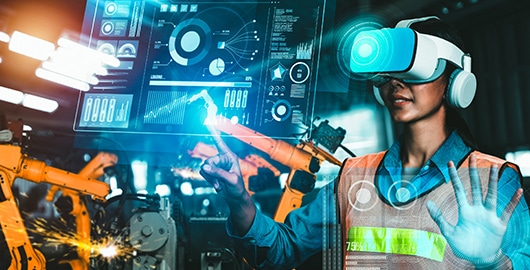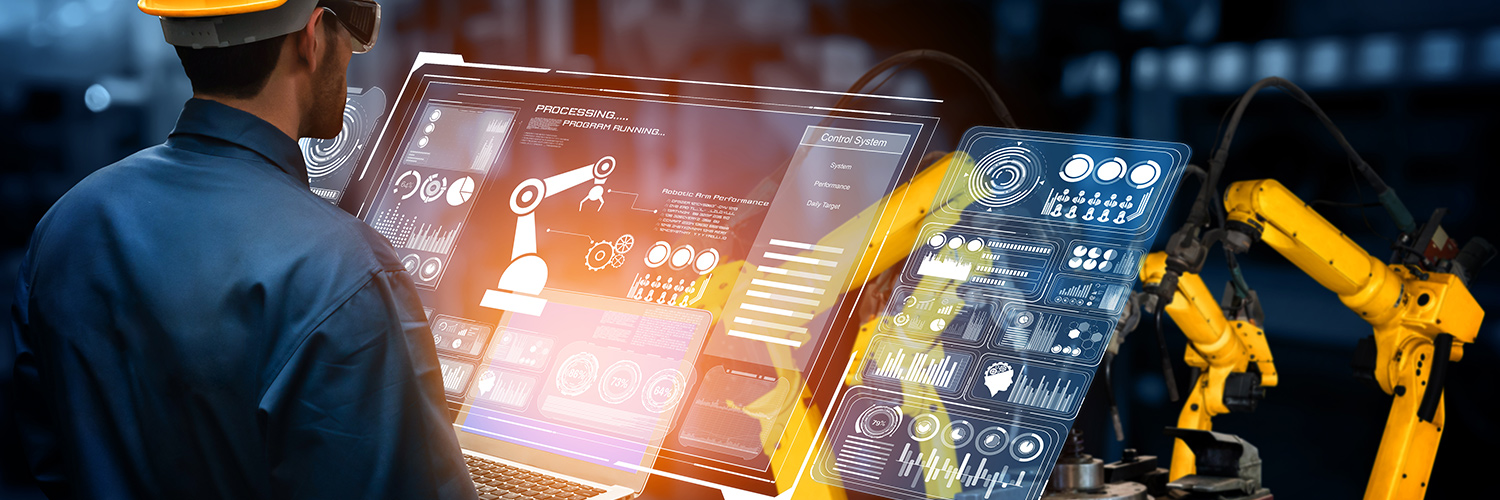Technology implications and Trends in the Manufacturing Industry: An Era of emerging Industry 5.0
October 18, 2023
“Leading companies take a holistic perspective on sustainability, examining the way products are transported, packaged, handled, and used—and what happens to them at the end of life.”
~ McKinsey’s Featured Insights
In recent years, we’ve witnessed an astonishing technological evolution reshaping the fabric of the manufacturing Industries. These industries have been the vanguards of innovation for decades, constantly pushing the boundaries of what’s possible. Commencing with the inception of assembly lines and advancing to the remarkable realms of robotics and automation, they have ardently embraced innovations to elevate operational efficiency and productivity to new heights.
Automation, a cornerstone of this transformation, has played a pivotal role in streamlining manufacturing processes. AI-powered systems can sift through vast data oceans, identifying intricate patterns and making predictions. The convergence of Artificial Intelligence (AI), the Internet of Things (IoT), and now 5G networks has given birth to smart factories, where machines make intelligent decisions and real-time data analysis becomes the norm. The dream of predictive maintenance is now a reality, thanks to sensors strategically placed on machinery that detect potential issues before they escalate into costly breakdowns.
A Historical Perspective on Tech Advancements in Manufacturing
The Industrial Revolution marked a significant point in the history of manufacturing. Technological advancements have consistently shaped and revolutionized the manufacturing industry, laying the foundation for future upgrades from the advent of steam power to the introduction of assembly lines.
As we move into an increasingly prevalent era of digitalization, we must understand our past achievements as we shape a future that embraces innovation while preserving core principles learned throughout history’s progress timeline. Looking back at these developments highlights how technological advancements have continually propelled manufacturing.
The Current State of the Manufacturing Industry
Today, we stand on the brink of yet another technological revolution – The emerging era of Industry 5.0, the Fifth Industrial Revolution, where humans and cutting-edge technology unite to revolutionize workplace processes. Gone are the days of humans versus machines; instead, we embrace a harmonious collaboration between humans and AI-powered robots. Industry 5.0 places humanity at the center while fortifying resilience and commitment to sustainability.
Key Challenges & Opportunities in the Manufacturing Sector
Manufacturers today confront various formidable challenges that demand strategic planning and meticulous navigation. From the persistent workforce skills gap to the escalating demand for highly skilled personnel and global supply chain issues, these global issues necessitate focused attention and innovative solutions.

Cybersecurity Concerns
The rise of interconnected systems and data-driven operations exposes manufacturers to heightened cybersecurity risks. Protecting invaluable intellectual property, sensitive customer information, and critical infrastructure from potential threats necessitates the implementation of robust cybersecurity protocols and a constant state of vigilance.

Supply Chain Disruptions
Supply chain disruptions present yet another formidable challenge for manufacturers. In our globalized economy, supply chains have grown intricately interconnected. Disruptions stemming from natural disasters, geopolitical tensions, or global pandemics can yield far-reaching consequences for manufacturing operations. Manufacturers must devise strategies to mitigate these risks, encompassing supplier diversification, real-time monitoring systems, and crisis management plans.

Sustainability Imperatives
As environmental consciousness rises, manufacturers face mounting pressures to embrace sustainability. Contemporary consumers demand products crafted with minimal environmental impact throughout their lifecycles. Meeting these expectations necessitates the adoption of energy-efficient manufacturing processes, waste reduction, the implementation of recycling programs, and the embrace of sustainable sourcing practices.

Workforce Skills Gap
Among the paramount challenges manufacturers face is the workforce skills gap. In the wake of technology’s rapid advancement, a noticeable disparity has emerged between the skills demanded by manufacturers and those possessed by the available workforce. Addressing this gap entails investment in comprehensive training and education programs, equipping workers with the expertise required to thrive in an increasingly automated and digitalized industry.
Transition to Industry 5.0 – Stepping into Reality
Emerging trends in Industry 5.0 transcends traditional boundaries, extending its reach far beyond manufacturing. It stands upon the shoulders of its predecessor, Industry 4.0, powered by a host of transformative digital technology developments and trends. These include Artificial Intelligence, Advanced Automation, Big Data Analytics, the Internet of Things, Machine Learning, Robotics, Smart Systems, Sustainability and Virtualization, and even generative AI makes inroads.
Advanced Automation & Robotics
This tech trend transforms manufacturing, enhances safety, and boosts productivity. They reduce human involvement in hazardous and repetitive tasks, ensuring workplace safety. Industrial robots play a pivotal role in increasing productivity and offering predictive insights. These machines precisely execute tasks, detect potential issues, safeguard workers, and redefine manufacturing’s future.
Big Data and Analytics
Data is the king; manufacturers reign in a wealth of information when harnessed and analyzed. The possibilities are boundless, from customer feedback and production data to supply chain insights. Advanced analytics tools sift through the information, identifying patterns, trends, and potential areas for improvement. It’s a journey toward a more personalized, responsive, and satisfying customer experience—one data point at a time.
Internet of Things / Servitization
IoT and sensors are the manufacturing industry’s eyes and ears, constantly collecting and transmitting data from the field. This data stream collects real-time data from products and equipment in the field, enabling manufacturers to monitor performance, predict maintenance, and proactively address issues. It transforms from reactive to proactive, delighting customers with seamless experiences. New business models are emerging based on servitization adopted by industrial manufacturers.
Artificial Intelligence
Artificial Intelligence (AI) is the driving force behind the manufacturing revolution. Across various industrial operations, from asset tracking to quality control, AI is reshaping the landscape, optimizing processes, and delivering unprecedented efficiency. It is a versatile tool deployed across a spectrum of tasks. But what truly sets AI apart is its ability to unlock a treasure trove of insights through data analysis, offering manufacturers a roadmap to maintenance optimization, production efficiency, and asset management.
Extended Reality
Extended Reality (XR), encompassing Virtual Reality (VR) and Augmented Reality (AR), is a transformative tool with its remarkable ability to enhance employee training and education, heralding a new era of workforce readiness, addressing critical skills gaps, and elevating productivity while reducing errors.
Sustainable Manufacturing
In today’s world, sustainability is a necessity and a requirement-driven compliance and expectations. Manufacturers worldwide are recognizing their critical role and commitment to reducing waste, conserving resources, and minimizing the use of harmful substances, building a greener future. By harnessing renewable energy, embracing circular economy principles, and optimizing production processes, manufacturers are positively impacting the environment and ensuring their long-term success in an increasingly eco-conscious world.
Right-shoring
This brings manufacturing operations in domestic markets based on market demands and supply chain issues, offering many benefits that resonate with manufacturers and local economies. One of the most immediate and tangible advantages of reshoring is that the need for long-distance shipping diminishes when the manufacturing unit is closer to the end market. This translates to cost savings in logistics, transportation, and warehousing, enhancing quality supply chain resilience and reducing vulnerabilities to disruptions such as port closures or geopolitical tensions.
Digital twins
The tech trend is the linchpin of precision in manufacturing. These powerful tool issues and sensor data from manufacturing equipment enable manufacturers to detect anomalies, forecast potential issues, and optimize production processes with unparalleled precision. By leveraging the insights offered by digital twins, manufacturers can stay ahead of the curve, reduce downtime, and minimize disruptions.
Emergence of Generative AI
It is also evident that it will play an essential role in product design simulations and improve product quality. The use cases are in emergence to capitalize on the power.

Conclusion
The path to success in today’s manufacturing landscape isn’t merely about staying competitive; it’s about embarking on a journey into uncharted realms of innovation and growth by leveraging digital technologies. Manufacturers must proactively embrace these technological strides, investing in human capital development and cutting-edge advancements. By doing so, they position themselves at the forefront of an ever-evolving business landscape, ready to seize the opportunities. Join us as we continue to explore the latest developments, innovations, and groundbreaking breakthroughs shaping mobility’s electrifying and autonomous future. Let’s infuse the road ahead with promise as we embark on an exhilarating journey into the future of manufacturing excellence!
Key Contributor: Dolly Krithika – Content/ Research & Sales Enablement



